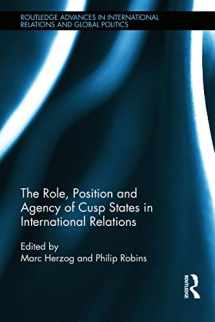
The Role, Position and Agency of Cusp States in International Relations (Routledge Advances in International Relations and Global Politics)
ISBN-13:
9780415707176
ISBN-10:
041570717X
Edition:
1
Author:
Philip Robins, Marc Herzog
Publication date:
2014
Publisher:
Routledge
Format:
Hardcover
192 pages
FREE US shipping
Book details
ISBN-13:
9780415707176
ISBN-10:
041570717X
Edition:
1
Author:
Philip Robins, Marc Herzog
Publication date:
2014
Publisher:
Routledge
Format:
Hardcover
192 pages
Summary
The Role, Position and Agency of Cusp States in International Relations (Routledge Advances in International Relations and Global Politics) (ISBN-13: 9780415707176 and ISBN-10: 041570717X), written by authors
Philip Robins, Marc Herzog, was published by Routledge in 2014.
With an overall rating of 3.8 stars, it's a notable title among other
books. You can easily purchase or rent The Role, Position and Agency of Cusp States in International Relations (Routledge Advances in International Relations and Global Politics) (Hardcover) from BooksRun,
along with many other new and used
books
and textbooks.
And, if you're looking to sell your copy, our current buyback offer is $0.3.
Description
This work seeks to develop a new concept with which to analyse the actions and activities of states that tend to be relatively ignored by the discipline of International Relations (IR). As a discipline, IR has a tendency to lean towards the analytically safe. Given the current and recent dynamism of the international system that is both surprising and undesirable. Arranged around the concept of the idea of the Cusp State (and cuspness more generally), the book consists of empirical analysis of eight different countries Brazil, Iran, Israel, Japan, Mexico, Taiwan, Turkey and Ukraine, defined as ‘states that lie uneasily on the political and/or normative edge of what is widely believed to be an established region’. By focusing on the importance of comparing groups of states, like states with high degrees of ‘cuspness’, this book argues that it is possible to categorise the world in a fresher and more original way, and one which covers more of the globe than either a systemic or regionalist approach would do. This work will be of great interest to students and scholars of Geopolitics, International Security and Regionalism.


We would LOVE it if you could help us and other readers by reviewing the book
Book review

Congratulations! We have received your book review.
{user}
{createdAt}
by {truncated_author}


